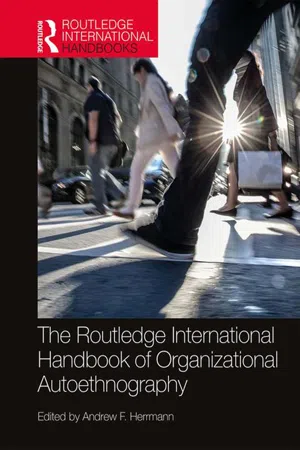
- 516 pages
- English
- ePUB (mobile friendly)
- Available on iOS & Android
The Routledge International Handbook of Organizational Autoethnography
About This Book
For nearly 40 years researchers have been using narratives and stories to understand larger cultural issues through the lenses of their personal experiences. There is an increasing recognition that autoethnographic approaches to work and organizations add to our knowledge of both personal identity and organizational scholarship. By using personal narrative and autoethnographic approaches, this research focuses on the working lives of individual people within the organizations for which they work.
This international handbook includes chapters that provide multiple overarching perspectives to organizational autoethnography including views from fields such as critical, postcolonial and queer studies. It also tackles specific organizational processes, including organizational exits, grief, fandom, and workplace bullying, as well as highlighting the ethical implications of writing organizational research from a personal narrative approach. Contributors also provide autoethnographies about the military, health care and academia, in addition to approaches from various subdisciplines such as marketing, economics, and documentary film work.
Contributions from the US, the UK, Europe, and the Global South span disciplines such as organizational studies and ethnography, communication studies, business studies, and theatre and performance to provide a comprehensive map of this wide-reaching area of qualitative research. This handbook will therefore be of interest to both graduate and postgraduate students as well as practicing researchers.
Winner of the 2021 National Communication Association Ethnography Division Best Book Award
Winner of the 2021 Distinguished Book on Business Communication Award, Association for Business Communication
Frequently asked questions
Table of contents
- Cover
- Half Title
- Series Page
- Title Page
- Copyright Page
- Dedication
- Table of Contents
- List of figures
- List of tables
- List of contributors
- Acknowledgments
- Introduction: organizing a handbook and how to use it
- Section I Situating organizational autoethnography
- Section II Autoethnography across organizational disciplines
- Section III Organizations and organizing
- Section IV Organizing organizational identities
- Section V Writing and evaluating organizational autoethnography
- Section VI Organizing the future of organizational autoethnography
- Conclusion: organizing the future of organizational autoethnography
- Index